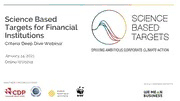
sbt fi criteria deep dive webinar slides 1.14.21 PDF
Preview sbt fi criteria deep dive webinar slides 1.14.21
Science Based Targets for Financial Institutions Criteria Deep Dive Webinar January 14, 2021 Online Webinar Welcome This webinar is being recorded. Slides and recording will be distributed online. There will be time for questions and discussion at multiple points throughout the webinar. Please type your questions into the Q&A box. Today’s Speakers Nate Aden Chendan Yan Senior Associate Research Associate [email protected] [email protected] World Resources Institute World Resources Institute SBTi Overview | Today’s topics Topic Time SBT initiative Update 10 min Financial Criteria Deep Dive 70 min (with Q&A throughout) Next Steps and Opportunities to Participate 10 min 4 #sciencebasedtargets SBTi Financial Sector Project and initiative Update SCIENCE-BASED TARGETS FOR FINANCIAL INSTITUTIONS In 2018, the SBTi launched a project to help financial institutions align their lending and investment portfolios with the ambition of the Paris Agreement. The primary audience includes commercial banks, asset managers, asset owners, and mortgage real estate investment trusts (REITs). SBTi Finance Framework | 64 Committed Financial Institutions Newly EQT AB Hannon Armstrong Actiam NV committed Phoenix Group Holdings plc Hitachi Capital Corporation London Stock Exchange FIs since NatWest Group plc Zurich Insurance Group Ltd Fubon Financial Holdings the launch Shinhan Financial Group Yuanta Financial Holding Co Ltd Capitas Finance Limited Direct Line Insurance Group plc Vakifbank Grupo Financiero Banorte SAB de CV Türkiye İş Bankası ASN Bank HSBC Holdings plc Commerzbank AG Swedbank AB T.GARANT_ BANKASI A._. Albaraka Türk Participation Bank ABN Amro Bank N.V. Credit Agricole Caixa Geral de Depósitos YES Bank BNP Paribas Piraeus Bank SA DGB FINANCIAL GROUP KLP Eurazeo Standard Chartered Bank MetLife, Inc. SK Securities, Co., Ltd Allianz Investment Management SE MS&AD Insurance Group Holdings, Inc. Amalgamated Bank Mahindra & Mahindra Financial Services Societe Generale Chambers Federation Limited Australian Ethical Investment Novo Banco, SA Raiffeisen Bank International AG BanColombia SA MP Pension Commercial International Bank Egypt Bank Australia OXI-ZEN Solutions SA (SAE) CIB Teachers Mutual Bank Storebrand ASA Tokio Marine Holdings, Inc. Westpac Banking Corporation Swiss Re BBVA AXA Group Tribe Impact Capital LLP Sompo Holdings, Inc. Bank J. Safra Sarasin AG FullCycle La Banque Postale ING Group PensionDanmark Principal Financial Group, Inc. TSKB 7 SBTi Finance Framework | Framework Components Criteria SBTs for Methods Tools FIs Guidance 8 SBTi Finance Framework | 3 Methods for Finance Sector Targets For the first phase of this project, the SBTi supports three methods for financial institutions. The SBTi developed criteria specific to these three methods. Sectoral SBT Portfolio Temperature Decarbonization Coverage Rating Approach Approach (SDA) Approach 9 SBTi Finance Framework | Method & Asset Class Coverage Links Asset Class Method Description Sector Decarbonization Emissions-based physical intensity targets are set for non-residential Real Estate Approach (SDA) buildings’ intensity and total GHG emissions. SDA Emissions-based physical intensity targets are set for residential buildings’ Mortgages intensity and total GHG emissions. SDA Emissions-based physical intensity targets are set for electricity Electricity Generation generation projects’ intensity and total GHG emissions. Project Finance SDA Emissions-based physical intensity targets are set at sector level within the portfolio for sector where sectoral decarbonization approaches are available. SBT Portfolio Coverage Financial institutions engage a portion of their investees to have their own Corporate Instruments science-based targets such that they will reach 100% coverage by 2040. (equity, bonds, loans) Temperature Rating This approach enables financial institutions to determine the current temperature rating of their portfolio and take actions to align their portfolios to ambitious long-term temperature goals by engaging with portfolio companies to set ambitious targets (e.g., 2.6°C in 2019 and 1.7°C in 2025). 10
